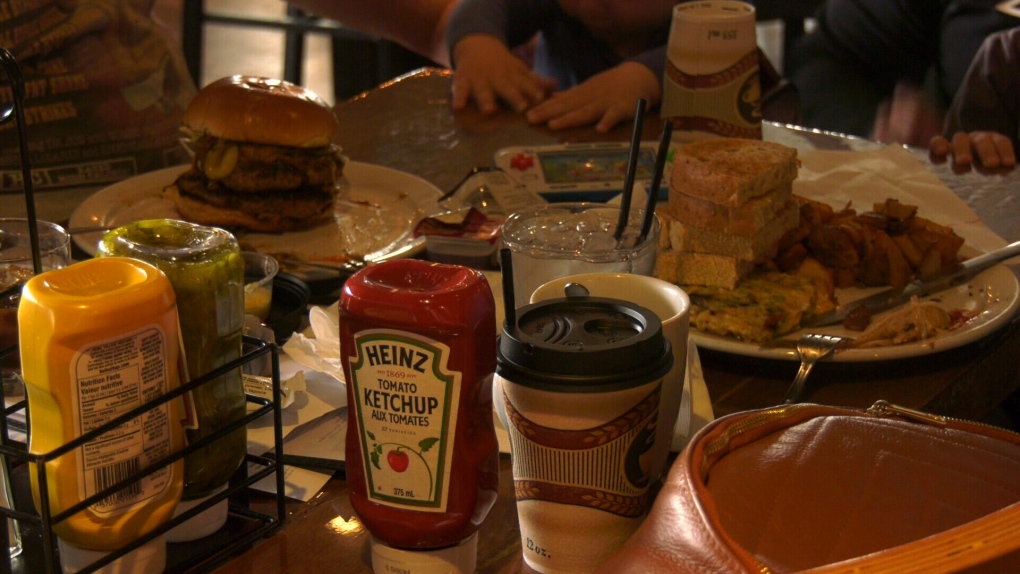“I can tell you that the people that are doing it aren’t the people who are coming here because they’re looking for a sandwich because they’re hungry,” said Ravi Ramberran, “It’s the people who are not afraid of consequences period.”
In the wake of the increase in dine and dashers, Ramberran said his restaurant has ramped up how they deal with it.
“We blast them on Facebook, we hold them, we make them wait for the cops…We do what’s in our power to do.”



I am on the Artemis app for Kbin which hasn’t been updated to allow quoting yet so excuse the strange formatting. Each of the following paragraphs will address each point in order.
1: Wages will certainly not adjust if tipping went away, there would just be less workers willing to take those roles. It’s not the workers keeping wages artificially low, it’s the restaurants owners who do. Having workers successfully demand higher wages on an industry wide scale just isn’t feasible without unionization. Sure there may be individual situations where workers actually get a raise but I don’t see this being the norm. Employers do not have to capitulate to raising wages, especially if workers have no other options available to them.
2: Workers can get tipped and be paid fairly. It’s not a zero-sum game. Paying workers a livable wage so they don’t rely on tips is what I consider to be the “winning situation”. Customers can tip if they want to which means more money for the worker and if they don’t receive tips then it’s not big deal since their wages are enough to cover their expenses. This is in contrast to what we have now where tips are used to supplement wages. So with increased wages and with people still deciding to tip on occasion, the average worker would actually make more money, not less. In terms of revenue for the restaurant owner or chain exec, I could care less.
3: You are ignoring a variety of important factors in the assertion. Not everybody lives in an area or can easily move to one where they can make that much in tips. Not everybody can easily switch jobs and take a gap in pay. Not everyone is in an area flush with jobs where they can get paid properly. Sometimes surprise expenses come up and mess up your budget when you are living paycheck to paycheck. Basically, not everyone has the means to actually do what you are suggesting. If people could easily find a new job to make up for any budget shortfalls then we wouldn’t see bankruptcy and homelessness run rampant.
4: People don’t care about the actual concept of tipping at all. Who needs to drive this is restaurant workers getting together and collectivizing to have bargaining power over restaurant owners. I doubt workers care about tipping over getting paid a livable wage with the added bonus of some people still tipping. If workers withhold their labor then restaurant owners will have to give in. This will lead to actual material change for these workers. I know it’s a long shot but it is a viable way to achieve these goals without involving consumers and their tipping habits. All of this is achievable (unless restaurant owners do what hospitals do when they try to unionize and bring in outside labor at a higher cost (which ironically would increase wages for those people, just not for those who got fired for trying to bargain) within our current legal framework.
Guess what happens when there are fewer workers willing to work in a role…?
And restaurants will have no trouble paying it because they will be able to raise their prices when there are no tips. It’s like not like that $100 + $20 tip meal is going to move to being a $100 meal. It’s going to become a $120 meal. There will still be the same amount of money sloshing around in the system. All you are really doing is changing how it is accounted for.
Of course, that does put more control in the hands of the restaurant. Now it is their revenue, not yours. A restaurant taking what was a $40 per hour, tip in, job and trying to squeeze it to $35 per hour and keeping $5 for themselves is a real possibly, just like I told in an early comment. It is always best to be the one in control. More revenue beats less revenue.
You’re limited by what the customer is willing to spend, and they are only going to spend so much. That is zero-sum.
Restaurant margins are already basically zero, so there is no capacity to pay workers more without raising prices. That isn’t going to happen without tips taking the squeeze. That $120 meal above is not going transform into a $144 receipt.
Higher wages and less tips, or a lower wage and more tips. Pick your poison. Of course, if you are the server, more tips is the way to go. It gives you the control, not the restaurant. And if you are unscrupulous, which I do not condone but seems to be the norm, it is easy to hide from the government. That’s a huge additional pay bump.
That is true. I completely missed the most obvious part: You are going to ask other servers what the tips are like before you even consider taking the job. So if a restaurant struggles to attract the right clientele, you’re not going to sign on in the first place.
Remember, at a good restaurant it is a $80-100k per year job (FTE). We’re not talking about hopeless souls here. We’re talking about top people who are highly intelligent and are especially skilled in dealing with people.
You want the largest benefactor of this system to be the one who brings the uprising? Methinks you’ve not thought this through.
Restaurants are most likely to lead the charge. They are highly incentivized to see that money become their revenue. And, indeed, many individual restaurants have tried (and failed, unsurprisingly) to do exactly that. A concerted effort by the entire restaurant industry, however, would no doubt be illegal.
1: “Guess what happens when there are fewer workers willing to work in a role…?” You’re responding to a hypothetical I’m not making which doesn’t address my argument. I’m advocating fair pay so workers aren’t reliant on inconsistent tips, not banning tipping outright. In my proposal, fair wages means decreased tips wouldn’t deter workers. Your hypothetical keeps pay low with no tips, unlike my proposal. When discussing the potential for restaurants to seize more control over revenue, it’s important to highlight the power of unions and collective bargaining. Unions exist to represent the interests of their members, and in this case, the workers. They provide a structured, legal avenue through which workers can negotiate better pay, benefits, and working conditions. When a union negotiates with a restaurant or a chain, they’re establishing legally binding agreements that outline worker compensation and rights. This ensures that even if prices increase, there is a legal obligation to ensure workers benefit. It’s a mechanism that places a check on the natural inclination of businesses to maximize profits, ensuring workers aren’t shortchanged in the process. Additionally, unions have strike funds and other resources to support workers who are fired or face retaliation for union organizing, as we are seeing with the recent strikes in Hollywood.
2: The notion that tips place power solely in the hands of the workers is a bit misleading. In fact, tips are at the mercy of customers, and, to some extent, the establishment. Factors like ambiance, quality of food, and even factors beyond a server’s control can influence tips. The current reliance on tips effectively offloads the responsibility of ensuring a living wage from the employer to the customer. This shouldn’t be the case. Workers should be guaranteed a livable wage, with tips serving as a bonus for exceptional service. As for the profit margins, it’s an oversimplification to say that restaurants operate strictly on slim margins and can’t afford wage hikes. If that were the case, how do we account for thriving chain restaurants and franchises? There are restaurants that are extremely profitable, and while there may be challenges in the industry, there is certainly room for wage adjustments.
3: Citing the earnings of top-tier restaurant servers as a standard is cherry-picking. The vast majority of servers don’t earn anywhere near that amount. Additionally, the variability and unpredictability of tips don’t disappear simply because some servers in upscale restaurants earn well. And if every server is supposed to find the highest-tipping establishments, then who fills the roles at the lower-tipping places? The logic doesn’t pan out.
4: The claim that high-earning servers wouldn’t want to unionize misses the bigger picture. The vast majority of restaurant workers are not top-tier servers at upscale establishments. They are workers struggling with low wages and unreliable tips. These workers have every reason to come together and unionize to demand better pay and working conditions from restaurant owners. Historically, the groups most affected by an unjust system are often the ones to lead the charge for change. The claim that restaurants would lead this charge contradicts established trends. Restaurants, as profit-driven entities, are unlikely to spearhead efforts that might cut into their profits unless compelled by external pressures – like a strong union.
Tipping isn’t driven by customers, but an unfair system offloading fair pay onto them. Workers shouldn’t have to rely on tips just to get by. The solution is empowering workers to demand fair wages so tipping returns to being a bonus, not a business model.
Was there a reason to introduce this bad faith direction?